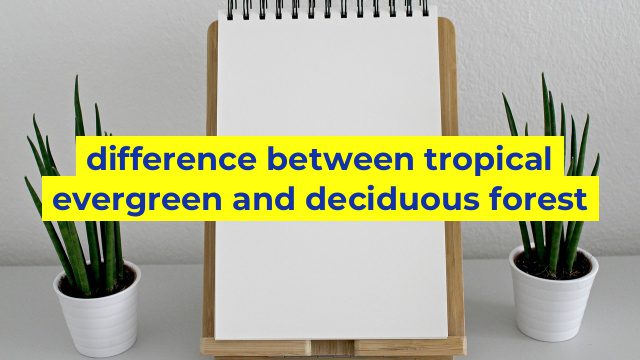Difference Between Tropical Evergreen and Deciduous Forest
Forests are considered as the lungs of our planet as they help in producing oxygen and absorbing harmful gases. They are divided into various types based on their vegetation, weather, and soil conditions. Two of the most common forest types are tropical evergreen and deciduous forests. Even though the terms might appear similar, these forests have quite a few unique features. This article will delve into the distinct differences between tropical evergreen and deciduous forests.
Tropical Evergreen Forest
Tropical evergreen forests, also known as tropical rainforests, are found in places that receive a significant amount of rainfall throughout the year. These forests are dense and lush, featuring a wide range of tall trees with leaves that are always green.
The evergreen canopy of this forest provides a suitable habitat for various species like monkeys, birds, and reptiles. Tropical evergreen forests are known for their high biodiversity and are home to many exotic animals and plants.
Deciduous Forest
Deciduous forests are primarily composed of trees that lose their leaves seasonally. These forests are found in regions that have four distinct seasons, including spring, summer, fall, and winter. The trees in deciduous forests shed their leaves during the fall season, and it grows back again during the spring.
Animals in these forests tend to adapt to the seasonal changes, and some migrate to other places to escape the cold winter. Deciduous forests are known for their stunning colors in autumn when the leaves of trees change from green to red or orange.
The Differences
Besides the difference in vegetation, there are a few more distinctions between tropical evergreen and deciduous forests. For starters, tropical evergreen forests thrive in high humidity and constant heat, whereas deciduous forests have a lower average temperature.
Another distinction is biodiversity. Tropical evergreen forests are known to be more diverse than deciduous forests, which have a limited range of species. Additionally, the soil of tropical evergreen forests is less fertile than deciduous forests.
Conclusion
The difference between tropical evergreen and deciduous forests lies in their vegetation, climate, and biodiversity. While tropical evergreen forests are known for their year-round luscious greenery and diversity in species, deciduous forests create a stunning landscape in the fall season. They both are vital ecosystems and contribute to maintaining the balance of our planet.
Table difference between tropical evergreen and deciduous forest
| Characteristic | Tropical Evergreen Forest | Deciduous Forest |
|---|---|---|
| Location | Found in regions with high rainfall and temperature, such as the Amazon Basin and Congo Basin | Found in regions with four distinct seasons, such as the northeast United States and parts of Europe and Asia |
| Temperature | Remains fairly constant throughout the year, between 20-25°C | Varies greatly between seasons, from hot summers to cold winters |
| Rainfall | High rainfall, usually above 2000mm per year | Moderate rainfall, usually between 500-1500mm per year |
| Vegetation | Characterized by tall, dense trees that form a continuous canopy, with epiphytes and lianas common | Characterized by trees that lose their leaves seasonally, with grasses and shrubs also present |
| Biodiversity | Home to a vast array of plant and animal species, with high levels of endemism | Home to a variety of plant and animal species, but with lower levels of endemism than tropical evergreen forest |
| Human Impact | Highly threatened by deforestation and land conversion for agriculture and urban development | Also impacted by deforestation, but to a lesser extent than tropical evergreen forest |
